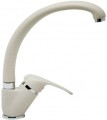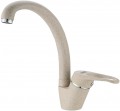Lever
—
Feather. Single-lever faucets, in which the joystick lever for controlling the flow of water is made in the form of a small narrow stick. It resembles a pen in shape and structurally enters directly into the cartridge (unlike conventional models, where such a lever is part of a plate that is attached to the cartridge). The pen can be placed both vertically and horizontally (depending on the design of the mixer). At a minimum, these products have an unusual appearance, and for some users, a joystick pen may be more convenient to use. On the other hand, such joysticks are found mainly among premium mixers.
—
Elbow (medical). Taps with a water regulation lever of an unusual shape, easy to use with your elbow. Such models are especially in demand in medical institutions, when the hands of a medical employee must always be clean and close the tap with them — already a violation of hygiene standards.
—
Joystick with a hole. The characteristic hole in the handle of single-lever taps plays both a decorative role and a practical one. For some models, it serves as a design element of the tap, and in general, the hole can be used to conveniently adjust the pressure and temperature of the water (by prying with a finger and then turning or raising/lowering the lever).
Jet depth
Distance from the fixing point (for vertically mounted taps) or from the centre of the mounting hole (for horizontally mounted taps) to the middle of the spout. It is a characteristic that determines the "reach zone" of the tap.
Mounting hole diameter
The diameter of the holes required to install the tap. This dimension allows you to assess whether the tap will be compatible with a sink, wall, etc., what dimensions the additional parts should have to install it, and whether the holes will need to be widened or narrowed.
Country of brand origin
Country of origin of the brand under which the tap is marketed. Usually, it is indicated by the "homeland" of the manufacturing company or by the location of its headquarters. The brands under which modern mixers are produced come mainly from the following countries (in alphabetical order):
Austria,
Belgium,
Germany,
India,
Spain,
Italy,
China,
Poland,
Russia,
Turkey,
Czech Republic,
Finland,
France,
Sweden.
There are many stereotypes associated with the “nationality” of brands and products, but most of them have no basis nowadays. First, the actual place of production is often different from the brand's country of origin. Secondly, the quality of the goods depends not so much on geography, but on the policy of a particular company and how carefully this very quality is controlled in it. Therefore, you should pay attention to the country of origin of the brand only if you fundamentally want or (do not want) to support a manufacturer from a certain state. Quality is best judged by the reputation of a particular
...brand and the overall price category of the tap.Manufacturer's warranty
The warranty period claimed by the manufacturer for a certain tap model is the period during which the manufacturer guarantees the normal operation of the device. The specific terms of the warranty may vary, however, usually, it covers factory defects and malfunctions caused by the fault of the manufacturer or seller and discovered during normal use, without violating the rules; if such defects or malfunctions appear during the warranty period, the manufacturer undertakes the obligation to correct the situation at its own expense — up to replacing the tap with a working one.
Nowadays, you can find taps with a guarantee of
4 years,
5 years,
7 years,
10 years and even
25 years. In general, the longer the warranty period, the more reliable the product is, the higher its overall quality, ceteris paribus, but the more expensive it will cost compared to analogues.

